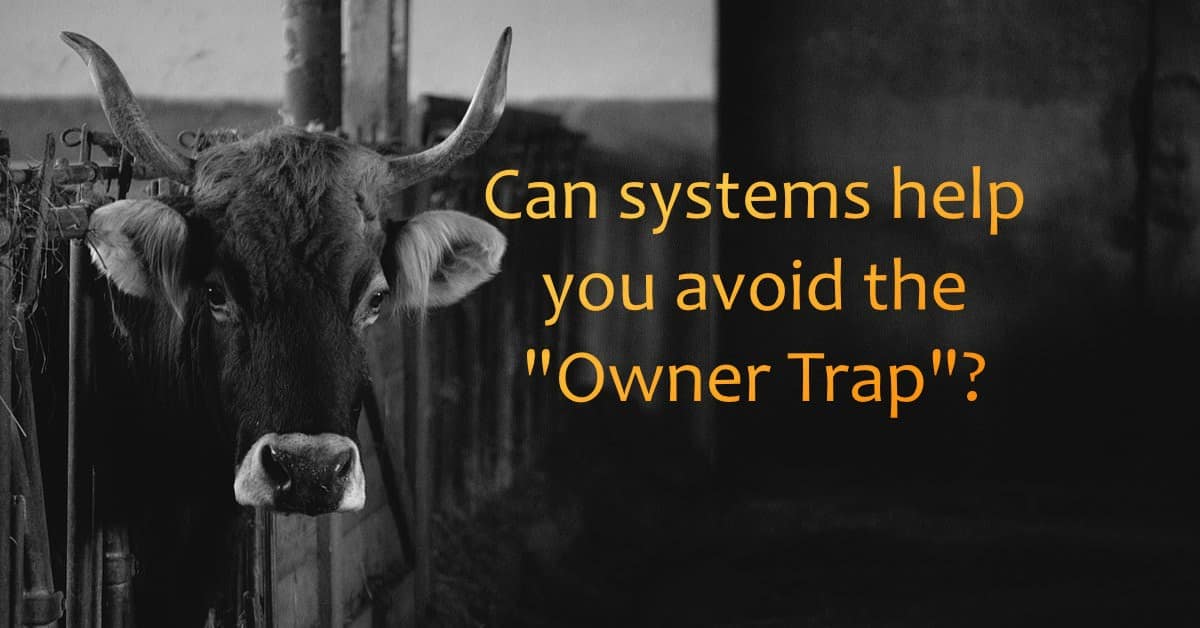Are you working on your business to make life easier in the future? Or are you anxious you’re too busy to give it the time it needs?
Rogan Hounsell-Roberts was a founder of a successful scale-up; has helped organisations across many sectors achieve success; is a founder of KR5 Consulting; and has a passion for helping ambitious business owners scale-up and exit.

What does “working on your business, not in it” mean? In brief it’s about moving the business forward – Forbes 5-Steps to Scale Your Business. That’s not as simple as it sounds. Business owners may be in the “owner trap”. Owners who work long hours working in the business meeting clients, managing staff, on calls, emails, checking work and generally making sure the business stays on track. Owners in the “owner trap” don’t have time for their family or themselves, let alone taking time to plan the future of the business. The “owner trap” is a vicious circle, the more you work the busier you get, and the busier you get, the less time there is to do something about it. When you’re in the “owner trap” it’s tough to dig yourself out. Far better to avoid the “owner trap” in the first place.
There are many different areas to “work on the business” and that might feel overwhelming. That might be around vision, direction, strategy, or brand. Then there are the systems. Many owners find a business coach can help them diagnose and prioritise. Of course, every operating business has systems otherwise it wouldn’t run. The systems might be in people’s heads or written down. One of the big system problems is if the owner is the system. Instead of the owner delegating work, the overworked owner is the business. For the owner to move the business forward, they must free up time to work on the business: Owners must build and trust systems to get everything done without them – Inc Work On your Business and not in your Business.
I’m busy, how do I start?
As Stephen Covey wrote in 7 habits of highly effective people, start with the end in mind. You want better systems to grow your business and have more time. You want better systems to move the business forward. Use this motivation to set goals and prioritise time to have regular slots to work on the business. You might have these in the diary as “Business Improvement”. Keep in mind the big picture of how all the systems work together, as you focus on one specific area of improvement at a time. In short, owners need to plan and implement the future business.
What if staff don’t know what to do?

One reason that owners hesitate to delegate is the worry that staff don’t know what to do. This is often the crux of the issue. Owners working in the business may have everything in their head, and you guessed it, too busy to build a system to delegate to staff – Overwhelmed with Work. Creating a system to delegate effectively helps with staff engagement. Staff can feel empowered by the system. Staff know how to be successful at what they do, and that helps with job satisfaction and engagement.
What if staff don’t have the skills?

Another reason that owners don’t delegate is the complexity of a task. Perhaps they think there are too many things to consider or that it requires too much knowledge. Systems can address complexity and other challenges for effective delegation and staff engagement. Some of those system challenges can be addressed through technology – Innovation of Technology in Scale-Ups.
Describing the process, tools and methods to get the job done has other benefits. Staff can learn a process. They can train on using tools, and practice methods until they’re competent. Think about that for a moment. Engaging staff in developing roles is good for retention. Having more than one person able to perform a role reduces key person risk. On-boarding new staff quickly and efficiently is good for staff engagement and reduces on-boarding cost. What’s not to like.
What if I’m worried about quality
Naturally, as an owner you want to protect your brand and ensure you keep promises to customers. You may feel that staff don’t know what it takes to make customers happy. Understanding what customers value is also working on the business. When owners understand what’s valued, they can define measures to deliver against. Clarity of value helps tune systems to deliver what’s needed. Creating a repeatable process with measures, methods and systems enables the business to deliver consistently – Owner Success – Consistency Culture in Business.
In summary
In summary, working on the business requires the discipline to set time to plan the future. Owners must decide what they want, and what their future business will be. Creating effective systems enables the business to grow as it’s key to effective delegation and creates space for the owners to work on the business and take care of themselves and their family. There are other benefits that include improving staff engagement and consistently delivering brand promises. If you’d like help, why not take the first step and arrange to have an informal chat with me in complete confidence.
KR5 Consulting is a business technology consultancy with a passion to help ambitious business owners. We provide a unique approach to business technology to help you scale-up and exit. Our approach delivers high-level views for the board, along with incremental and practical implementation. Our work starts by understanding the business direction and needs so we can work together to create a plan. We create a map of the current and future systems to create a clear overview and monitor progress. Our purpose is to help you accelerate, increase profits, scale-up, acquire customers and beat the competition. We do the heavy lifting so that senior leaders can focus their time on building a successful business.
If you’d like to explore the ideas in this article further or need help and advice, please contact Rogan at rhounsell@kr5consulting.com – to arrange an informal chat.
If you’ve found this blog interesting or useful, please ‘like’, ‘comment’ or ‘share’ so it can help others too.

